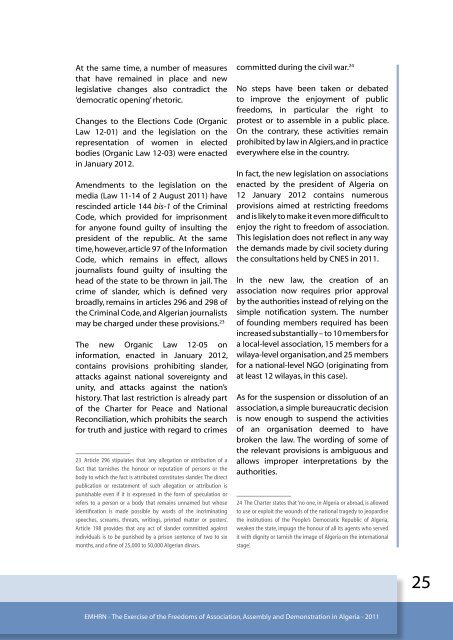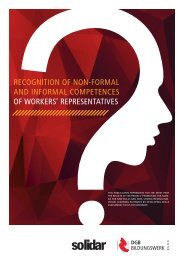Algeria - Solidar
Algeria - Solidar
Algeria - Solidar
You also want an ePaper? Increase the reach of your titles
YUMPU automatically turns print PDFs into web optimized ePapers that Google loves.
At the same time, a number of measures<br />
that have remained in place and new<br />
legislative changes also contradict the<br />
‘democratic opening’ rhetoric.<br />
Changes to the Elections Code (Organic<br />
Law 12-01) and the legislation on the<br />
representation of women in elected<br />
bodies (Organic Law 12-03) were enacted<br />
in January 2012.<br />
Amendments to the legislation on the<br />
media (Law 11-14 of 2 August 2011) have<br />
rescinded article 144 bis-1 of the Criminal<br />
Code, which provided for imprisonment<br />
for anyone found guilty of insulting the<br />
president of the republic. At the same<br />
time, however, article 97 of the Information<br />
Code, which remains in effect, allows<br />
journalists found guilty of insulting the<br />
head of the state to be thrown in jail. The<br />
crime of slander, which is defined very<br />
broadly, remains in articles 296 and 298 of<br />
the Criminal Code, and <strong>Algeria</strong>n journalists<br />
may be charged under these provisions. 23<br />
The new Organic Law 12-05 on<br />
information, enacted in January 2012,<br />
contains provisions prohibiting slander,<br />
attacks against national sovereignty and<br />
unity, and attacks against the nation’s<br />
history. That last restriction is already part<br />
of the Charter for Peace and National<br />
Reconciliation, which prohibits the search<br />
for truth and justice with regard to crimes<br />
23 Article 296 stipulates that ‘any allegation or attribution of a<br />
fact that tarnishes the honour or reputation of persons or the<br />
body to which the fact is attributed constitutes slander. The direct<br />
publication or restatement of such allegation or attribution is<br />
punishable even if it is expressed in the form of speculation or<br />
refers to a person or a body that remains unnamed but whose<br />
identification is made possible by words of the incriminating<br />
speeches, screams, threats, writings, printed matter or posters’.<br />
Article 198 provides that any act of slander committed against<br />
individuals is to be punished by a prison sentence of two to six<br />
months, and a fine of 25,000 to 50,000 <strong>Algeria</strong>n dinars.<br />
committed during the civil war. 24<br />
No steps have been taken or debated<br />
to improve the enjoyment of public<br />
freedoms, in particular the right to<br />
protest or to assemble in a public place.<br />
On the contrary, these activities remain<br />
prohibited by law in Algiers, and in practice<br />
everywhere else in the country.<br />
In fact, the new legislation on associations<br />
enacted by the president of <strong>Algeria</strong> on<br />
12 January 2012 contains numerous<br />
provisions aimed at restricting freedoms<br />
and is likely to make it even more difficult to<br />
enjoy the right to freedom of association.<br />
This legislation does not reflect in any way<br />
the demands made by civil society during<br />
the consultations held by CNES in 2011.<br />
In the new law, the creation of an<br />
association now requires prior approval<br />
by the authorities instead of relying on the<br />
simple notification system. The number<br />
of founding members required has been<br />
increased substantially – to 10 members for<br />
a local-level association, 15 members for a<br />
wilaya-level organisation, and 25 members<br />
for a national-level NGO (originating from<br />
at least 12 wilayas, in this case).<br />
As for the suspension or dissolution of an<br />
association, a simple bureaucratic decision<br />
is now enough to suspend the activities<br />
of an organisation deemed to have<br />
broken the law. The wording of some of<br />
the relevant provisions is ambiguous and<br />
allows improper interpretations by the<br />
authorities.<br />
24 The Charter states that ‘no one, in <strong>Algeria</strong> or abroad, is allowed<br />
to use or exploit the wounds of the national tragedy to jeopardise<br />
the institutions of the People’s Democratic Republic of <strong>Algeria</strong>,<br />
weaken the state, impugn the honour of all its agents who served<br />
it with dignity or tarnish the image of <strong>Algeria</strong> on the international<br />
stage’.<br />
25<br />
EMHRN - The Exercise of the Freedoms of Association, Assembly and Demonstration in <strong>Algeria</strong> - 2011

















